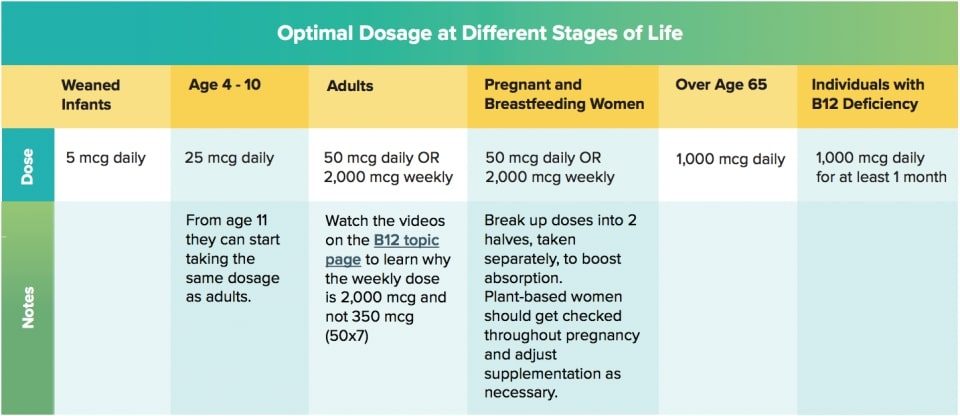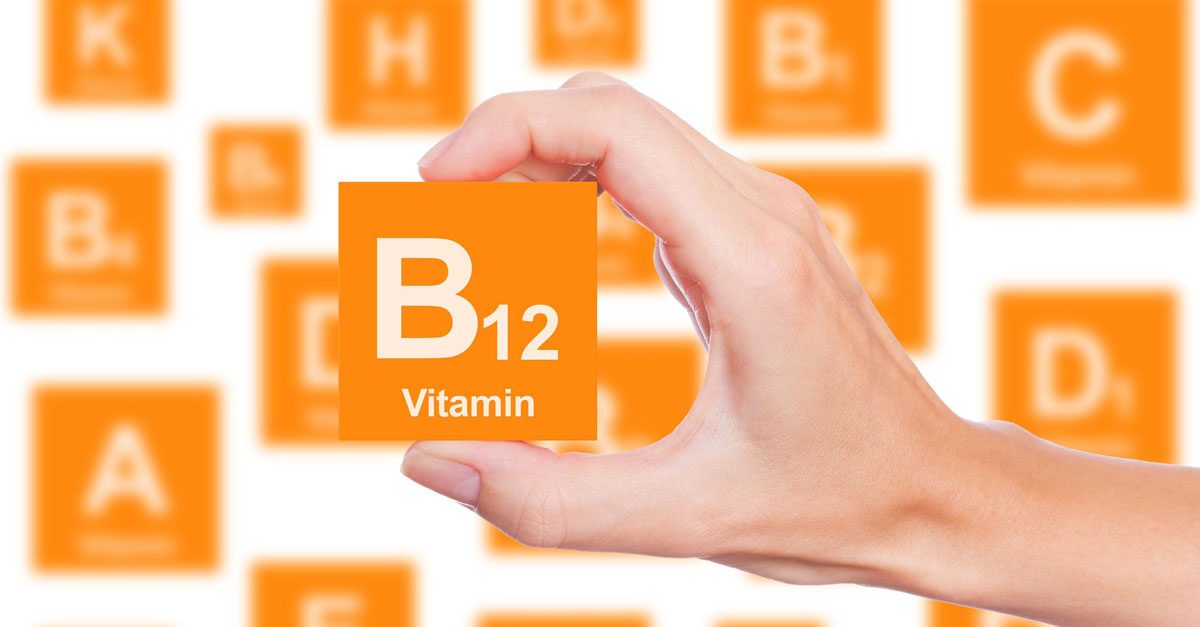Vitamin B12 is not made by plants or animals, but by microbes that blanket the earth. In today’s sanitized, modern world, the water supply is commonly chlorinated to kill off any bacteria. So, while we don’t get much B12 in the water anymore, we don’t get much cholera, either, which is a good thing!
Why Vitamin B12 Is Important
Though it may take years for deficiency to develop in those starting out with adequate stores of vitamin B12, the results of B12 deficiency may include a magnitude of devastating physical and psychiatric symptoms, including death.
Newborn infants of mothers who eat a plant-based diet and fail to supplement may develop deficiency much more rapidly—and with disastrous results. Getting enough vitamin B12 is absolutely non-negotiable for those centering their diets around plant-based foods.
How Much Vitamin B12 Do We Need?
I recommend:
- at least 2,000 mcg (µg) cyanocobalamin once each week, ideally as a chewable, sublingual, or liquid supplement taken on an empty stomach
- or at least 50 mcg daily of supplemental cyanocobalamin
- or a serving of B12-fortified foods three times a day, each containing at least 190 percent of the Daily Value listed on the nutrition facts label
Those over 65 years of age should take at least 1,000 mcg (µg) cyanocobalamin every day.
And, here’s a tip: If you’re experiencing deficiency symptoms, the best test is a urine MMA—not serum B12 level).
How much vitamin B12 should be taken at different stages of life? Check out my videos The Optimal Vitamin B12 Dosage for Adults and The Optimal Vitamin B12 Dosage for Kids, Pregnancy, and Seniors which go into detail. This chart may be useful as an overview:

What Are The Symptoms of Vitamin B12 Deficiency?
As I elaborate on in my video The Symptoms of Vitamin B12 Deficiency, these include:
- Abdominal distention
- Chronic diarrhea
- Shortness of breath
- Swollen, red, painful feet
- Skin darkening
- Bilateral useless hand syndrome
- Numbness and tingling in the hands and feet
- Muscle cramps
- Dizziness
- Cognitive disturbances
- Difficulty walking
- Erectile dysfunction
- Fatigue
- Depression
- Psychosis
- Coma
- Blindness
Vitamin B12 Deficiency Treatment
Is A Vitamin B12 Shot Better Than Taking B12 Orally?
Your doctor may want you to get vitamin B12 shots, but did you know that oral B12—even for those who can’t absorb it well—has long been considered one of medicine’s best kept secrets? In fact, it’s been found that B12 supplements taken orally are just as effective as intramuscular shots in overcoming states of deficiency when you take up to 1,000 micrograms a day.
Too Much B12 and Acne
You may have heard that vitamin B12 can cause acne, but that isn’t the whole story. As first described back in the 1950s, about one in ten people erupted in acne within days or even hours of getting an injection of vitamin B12, but it disappeared rapidly when the B12 shots stopped. Certainly, those on plant-based diets have to take supplemental B12, but we don’t have to get B12 shots. Vitamin B12–related acne tends to occur only in dosages in excess of 5,000 to 10,000 micrograms a week, which is well in excess of the 50 daily micrograms or single 2,000 mcg weekly dose I recommend. (Those over 65 years of age, however, should take at least 1,000 mcg cyanocobalamin every day.) If you get a B12 injection, the likelihood of it triggering acne may only be about one in ten.
What Are The Sources Of Vitamin B12?
If you want to get your B12 from fortified foods rather than take supplements, you’d have to eat three separate servings of B12-fortified foods, ideally with each serving containing at least 190 percent of the Daily Value on the product’s nutrition facts label.
Foods sources of B12 include:
- Fortified plant-based meats
- Fortified plant-based milks
- Fortified breakfast cereals
- Fortified energy drinks
Are there any green light foods that contain vitamin B12?
Nutritional yeast is a commonly B12-enriched food source and one of my favorites.
How much nutritional yeast would you need to meet the recommended daily B12 dosage for an adult under the age of 65? It depends on the brand. For instance:
- Bragg’s: 1 teaspoon three times a day
- NOW: 2 teaspoons three times a day
- Bob’s Red Mill: 1 tablespoon three times a day
- KAL: 1 tablespoon three times a day
- Red Star: 1 tablespoon three times a day (note that only certain varieties are fortified)
- Trader Joe’s: 1½ tablespoons three times a day
Heads-up that Dr. Fuhrman’s nutritional yeast and Frontier Co-op’s are unfortified.
Check out my video The Healthiest Food Sources of Vitamin B12.
What Kinds Of Vitamin B12 Dietary Supplements Are Available?
There are two types:
- Cyanocobalamin
- Methylcobalamin
Which is better? I discuss this in my video The Best Type of Vitamin B12: Cyanocobalamin or Methylcobalamin.
I take cyanocobalamin as my B12 supplement for two reasons: its high stability and its track record of safety and efficacy.
Methylcobalamin is less stable than cyanocobalamin and is particularly susceptible to photodecomposition—that is, destruction from light exposure. One study found that even up to 2,000 micrograms a day of methylcobalamin wasn’t enough to correct vitamin B12 deficiency in one of three vegans tested.
There may be one caveat, though. Methylcobalamin may be better for those with impaired kidney function. It’s also been speculated that oral methylcobalamin or injected hydroxycobalamin may be preferable in smokers, but that hasn’t been confirmed. If you do have decreased kidney function and your doctor recommends methylcobalamin, you may need a much higher dose because it’s less stable, so be sure to ask them about what’s best given your condition.
Can Vitamin B12 Be Harmful In Excess?
Bone Fractures
In 2019, a study found an association between high intakes of vitamins B6 and B12 from food and supplements with the risk of hip fracture among postmenopausal women in the Harvard Nurses’ Health Study. It’s critical to note, though, that it was the combined high intake of vitamins B6 and B12. We know that treatment with a high dose of vitamin B6 may increase hip fracture risk on its own. Indeed, after a decade or so, those who had been taking high-dose B6 supplements had about a 40 percent higher hip fracture risk, but not those taking B12.
That’s what the Harvard study found, too: High intake of vitamin B12 alone was not associated with increased fracture risk. In fact, some observational studies suggest slightly lower fracture risk at high B12 blood levels. What we care about most, though, are interventional studies, where people are randomized to B12 so we can see what happens. When those trials are conducted, we find no increased fracture risk among those given B12.
Lung Cancer
In 2017, a study found that men taking B12 supplements appeared to have an increase in lung cancer risk. The researchers didn’t find such an association in women, and it was mostly seen among men who smoked. Could it be that B12 was feeding budding tumors or something? It’s hard enough to imagine a vitamin being carcinogenic on its own and even more so one that somehow affects only men and not women, too. The bottom line is that we needed replication of these findings with additional studies to answer these and other questions. And, indeed, when you put all the observational studies together, we find there is no significant correlation between the levels of B12 in the blood and lung cancer, whether or not you smoked. If anything, most studies seem to trend towards higher B12 levels being protective.
Check out all the videos on my latest recommendations on the Vitamin B12 topic page. If you prefer podcasts, listen to episodes All About Vitamin B12 Part 1 and Part 2. We also have an infographic that covers all the lasted B12 recommendations.
